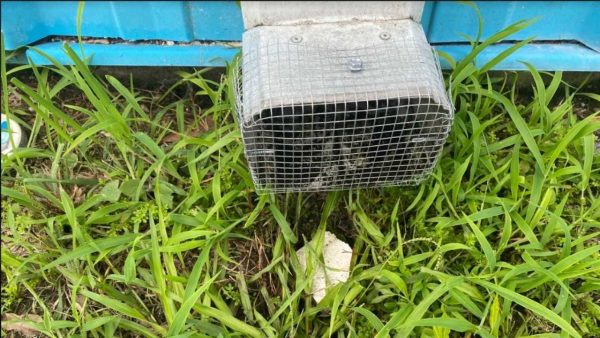Discover the Value of Pest Control in Maintaining a Healthy Setting and Treatment Techniques

The Duty of Pests in Ecological Communities
Bugs, typically watched entirely as problems, play a multifaceted role in communities that is important for keeping eco-friendly equilibrium. They add substantially to different eco-friendly processes, consisting of pollination, nutrient biking, and insect control. For instance, many insect types, such as butterflies and , are essential pollinators for a large range of plants, which consequently sustains biodiversity and food manufacturing.
In addition, parasites work as prey for many predators, producing a crucial web link in food webs. This interdependence makes sure the survival of various species and assists manage populaces within communities (Termite treatment Port Charlotte). Moreover, decomposer pests, such as particular beetles and fungis, contribute in damaging down raw material, hence enhancing dirt and assisting in vitamins and mineral recycling.
Conversely, while bugs can be advantageous, their overpopulation or invasion into non-native settings might disrupt these environmental features. This intricacy underscores the value of understanding pest dynamics, as efficient bug management approaches should consider both their eco-friendly duties and prospective effect on human tasks. Stabilizing pest presence while reducing harm is vital for protecting the integrity of ecosystems and making certain farming efficiency.
Health And Wellness Risks Connected With Bugs
The presence of insects in various settings expands past their environmental functions, as they also position considerable wellness threats to people and animals. Numerous insects, consisting of bloodsuckers, insects, and rats, are carriers of diseases that can have significant health and wellness implications. For example, rodents are recognized to send hantavirus and leptospirosis, both of which can result in serious respiratory system and renal issues, specifically.
Insects such as ticks and insects are infamous for spreading out vector-borne diseases like jungle fever, dengue high temperature, and Lyme disease. These health problems can cause high morbidity and mortality rates, particularly in prone populations. Additionally, pests like vermins and roaches can worsen allergic reactions and bronchial asthma, contributing to respiratory system problems in individuals, particularly those with pre-existing conditions.
Additionally, the presence of pests can result in psychological stress and anxiety and discomfort, impacting overall well-being. Contamination of food and surfaces by bug droppings and continues to be can lead to foodborne illnesses, highlighting the importance of maintaining hygienic conditions. Understanding the health and wellness dangers linked with bugs is critical in acknowledging the necessity of effective parasite management approaches to protect human and animal health and wellness.

Benefits of Reliable Bug Control
Efficient pest control is essential for preserving a healthy and secure atmosphere, as it constantly mitigates the various dangers related to parasite infestations. Among the key advantages of reliable pest management is the reduction of carcinogen. Parasites such as rodents, insects, and roaches are vectors for conditions that can impact both pet dogs and human beings. By regulating these populaces, the likelihood of illness transmission is dramatically reduced.
Furthermore, effective parasite control safeguards residential or commercial property and frameworks from damages. Several insects, like termites and carpenter ants, can trigger comprehensive architectural damage that might need expensive repairs. By proactively managing these home owners, companies and invasions can protect their investments.
One more considerable benefit is the improvement of total lifestyle. A pest-free setting contributes to mental well-being and minimizes anxiety related to infestations. Additionally, efficient parasite control promotes a more secure atmosphere for pets and kids, guaranteeing that homes continue to be sanctuaries without harmful chemicals and disease-causing microorganisms.
Typical Pest Control Methods

In the world of insect administration, numerous strategies are employed to battle infestations successfully. These strategies can be broadly categorized right into three primary techniques: cultural, mechanical, and chemical controls.
Cultural control involves customizing methods to minimize bug establishment, survival, and recreation. This may consist of crop rotation, correct cleanliness, and habitat adjustment, which jointly develop an atmosphere less favorable to pest proliferation.
Mechanical control uses physical approaches to eliminate pests (Termite treatment Port Charlotte). Techniques such as his response traps, obstacles, and vacuums are frequently used to directly remove insects from a location. This approach is especially reliable for managing rodents and pests without the use of unsafe chemicals
Chemical control includes the application of chemicals to manage parasites. These compounds can be categorized into fungicides, pesticides, and herbicides, each targeting particular sorts of parasites. It is vital to use these chemicals deliberately, adhering to safety and security standards and regulations to minimize possible harm to non-target varieties and the atmosphere.
Each bug control strategy has its restrictions and benefits, and typically, an incorporated approach integrating several methods yields the very best lead to preserving a pest-free environment.
Sustainable Bug Administration Practices
Sustainable insect management practices encompass a range of techniques created to lessen environmental impact while successfully managing bug populaces. These practices prioritize using environmentally friendly techniques over chemical pesticides, thus reducing the risk of harm to non-target types, including advantageous pests, wildlife, and people.
Integrated Pest Monitoring (IPM) is a cornerstone of lasting methods, combining organic, cultural, mechanical, and chemical tactics to handle parasites. Organic control entails presenting all-natural predators or parasites to reduce insect populations. Cultural methods, such as plant rotation and polyculture, interfere with pest life process and enhance ecological community durability.
Mechanical approaches, such as barriers or traps, can successfully avoid parasite access without chemical treatment. In addition, preserving healthy and balanced ecological communities through appropriate dirt monitoring, plant health and wellness, useful content and biodiversity can naturally alleviate pest problems.
Education and learning and awareness are crucial components, empowering individuals and communities to identify bug hazards early and execute safety nets. Termite treatment Port Charlotte. By fostering an alternative technique that stabilizes parasite control with eco-friendly honesty, sustainable parasite monitoring techniques not only secure crops and frameworks however also add to a healthier atmosphere for future generations
Conclusion

Recognizing the health and wellness threats linked with insects is crucial in acknowledging the need of reliable insect management approaches to safeguard animal and human health.
Efficient pest control is necessary for maintaining a healthy and balanced and local bug control secure atmosphere, as it continually reduces the various risks linked with insect invasions.Integrated Parasite Monitoring (IPM) is a foundation of lasting techniques, incorporating organic, cultural, mechanical, and chemical methods to manage insects. By comprehending the role of pests, acknowledging involved health risks, and employing varied treatment strategies, a lasting method to pest management can be accomplished. Integrated Insect Management (IPM) highlights a holistic technique that reduces damage to useful microorganisms while effectively controlling insect populations.